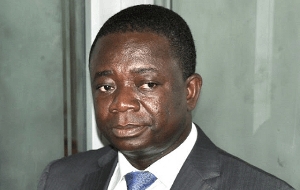- Home - Sports
- Soccer Portal
- Archived Sports News
- Sports Videos | TV
- Year In Review
- Sports Photos
- Sports Headlines
- Boxing
- Athletics
- Basketball
- Bodybuilding
- Cricket
- Golf
- Handball
- Hockey
- Martial Arts
- Tennis
- Volleyball
- Other Sports

General News of Saturday, 12 April 2003
Source:
Don't Tinker With the Constitution - Justice Brobbey
A supreme court judge, Mr Justice S.A. Brobbey, has warned against what he described as the “frivolous tinkering” with certain sensitive provisions of the Constitution.
He connected the need to amend certain provisions of the 1992 Constitution to reflect the current social realities but cautioned against tinkering frivolously with sensitive provisions.
Speaking at a seminar jointly organised by the Friedrich Naumann Foundation and the Ghana Centre for Democratic Development (CDD-Ghana), in Accra on Thursday, Mr Justice Brobbey noted that any tinkering without considering the reasons why such provisions were enacted, is likely to defeat the very purpose of any amendment.
The seminar was on the theme, “Entrenching Constitutionalism in Ghana.” Mr Justice Brobbey observed that the “overriding consideration in deciding to touch or not to touch any provision of the constitution with the intention of affecting any amendment is whether or not the targeted provisions for the amendment, are serving the purpose for which they were enacted or resolving the mischief for which they were enacted.”
He said the justification for an amendment may be premised on the fact that today’s dynamics may be contrary to the political philosophy at the time of the drafting of the constitution. Mr Justice Brobbey noted that as the fundamental law of the land and the law from which all mental other laws derive their validity, the Constitution ought to be given the utmost respect.
He said this objective cannot be achieved “if the constitution is subjected to all manner of amendments at the least prompting.”
Mr Justice Brobbey said the age of the constitution should not be the criterion for determining whether or not to amend certain provisions adding that “if a constitutional provision outlives its usefulness there is nothing wrong in considering an amendment.”
According o him, anytime an error is discovered, “there is no justification perpetuating the errors because we want to keep the document intact.” He pointed out among other things that article 267 (6), which deals with the disbursement of stool revenue, 267 (1) which looks at chiefs and parliamentary disqualification, and 94 (6) on eligibility to parliament are provisions which could be considered for amendment.
A former Deputy Attorney-General and Minister of Justice, Mr Martin Amidu, called for assessing the performance of the Constitution in the last ten years. He said the assessment must be informed as to whether the safeguards provided in the Constitution have been nurtured in practice.
“Has the power of government been exercised in such a manner that the party holding power does not do anything that is inimical to the existence of opposition parties? He queried. Mr Amidu expressed concern about the award of cost under the current judicial administration because it has the propensity of sending the wrong signals to the very people whose interest the constitution seeks to serve. He said that the Supreme Court and civil society have the collective responsibility to ensure that practices and procedures of adjudicating constitutional matters do not result in shutting the doors of justice to the most vulnerable in society.










